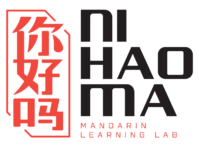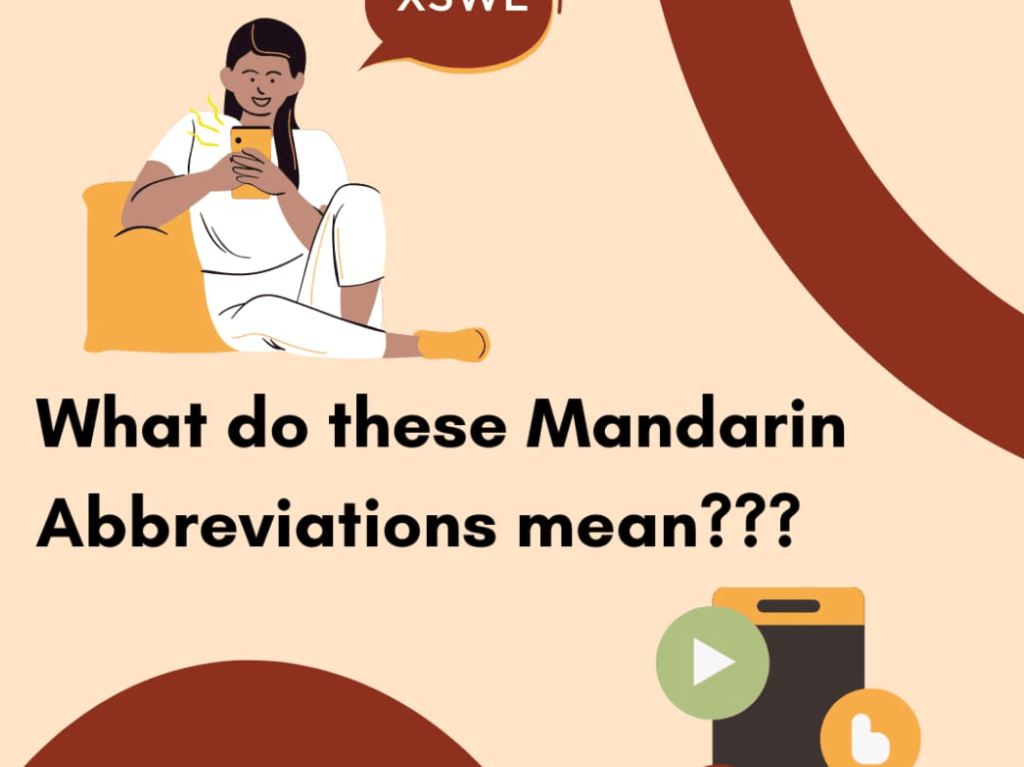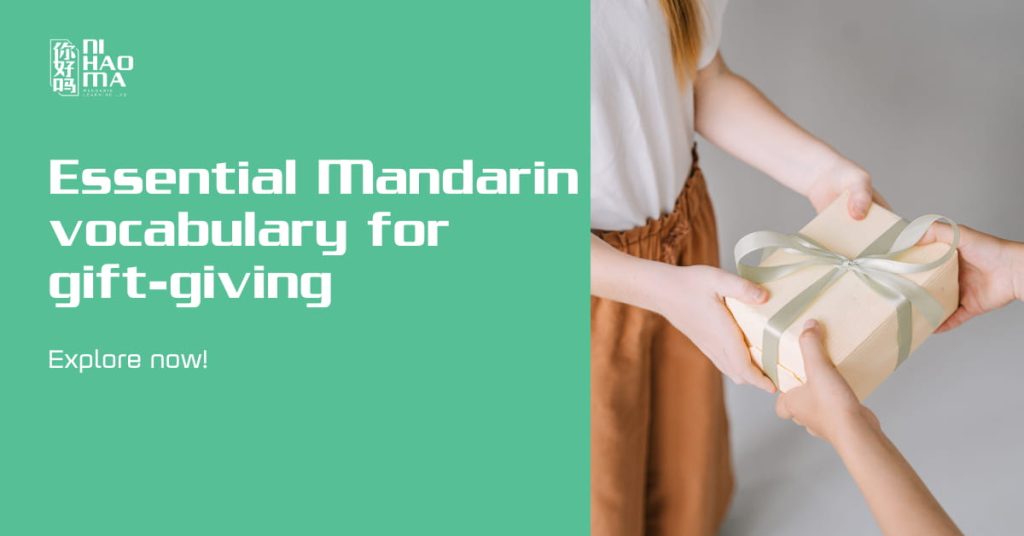Toys are not just simple entertainment items—they’re an essential part of life, especially for children. Whether you’re shopping for your kids, giving gifts, or simply having a conversation with little ones, knowing how to talk about toys in Chinese can be incredibly helpful. In this blog post, Ni Hao Ma will walk you through useful toy-related vocabulary in Chinese, complete with practical examples to help you communicate more effectively in the language.
Vocabulary for Toys in Chinese
When learning a new language like Chinese, expanding your vocabulary through familiar themes can make memorization quicker and more effective. The theme of toys is not only relatable for children but also frequently comes up in everyday life — from shopping and chatting to teaching and parenting. Whether you’re a beginner in Mandarin or looking to help your child with language learning, mastering the vocabulary for toys in Chinese will certainly be beneficial. Let’s dive into the essential words and phrases for this topic curated by Ni Hao Ma!
Chinese Vocabulary for Children’s Toys
| Chinese | Pinyin | Meaning |
|---|---|---|
| 玩具 | wánjù | toy |
| 洋娃娃 | yángwáwa | doll |
| 小汽车 | xiǎo qìchē | toy car |
| 玩具熊 | wánjù xióng | teddy bear |
| 火车玩具 | huǒchē wánjù | toy train |
| 积木 | jīmù | building blocks |
| 乐高 | lègāo | Lego |
| 拼图 | pīntú | puzzle |
| 机器人 | jīqìrén | robot |
| 玩具枪 | wánjù qiāng | toy gun |
| 水枪 | shuǐqiāng | water gun |
| 风筝 | fēngzhēng | kite |
| 遥控汽车 | yáokòng qìchē | remote control car |
| 悠悠球 | yōuyōqiú | yoyo |
| 模型飞机 | móxíng fēijī | airplane model |
| 钓鱼玩具 | diàoyú wánjù | fishing toy |
| 沙滩玩具 | shātān wánjù | sand toys |
| 橡皮泥 | xiàngpíní | playdough |
| 发条玩具 | fàtiáo wánjù | wind-up toy |
| 手偶 | shǒu’ǒu | hand puppet |
| 大富翁 | dàfùwēng | Monopoly |
| 球 | qiú | ball |
| 电子玩具 | diànzǐ wánjù | electronic toy |
| 音乐盒 | yīnyuè hé | music box |
| 魔方 | mófāng | Rubik’s Cube |
| 骰子 | shǎizi | dice |
| 弹珠 | tánzhū | marble |
| 陀螺 | tuóluó | spinning top |
| 遥控飞机 | yáokòng fēijī | remote control airplane |
| 起重机玩具 | qǐ zhòng jī wán jù | toy crane |
| 孔明锁 | kǒng míng suǒ | Luban lock |
| 乐器玩具 | yuèqì wánjù | musical toy |
| 多米诺骨牌 | duōmǐnuò gǔpái | dominoes |
| 扑克牌 | pūkèpái | playing cards |
| 小火车 | xiǎo huǒ chē | toy train |
| 手工材料 | shǒu gōng cái liào | craft materials |
| 泡泡机 | pào pào jī | bubble machine |
| 恐龙模型 | kǒng lóng mó xíng | dinosaur model |
| 打地鼠玩具 | dǎ dì shǔ wán jù | whack-a-mole toy |
| 万花筒 | wànhuātǒng | kaleidoscope |
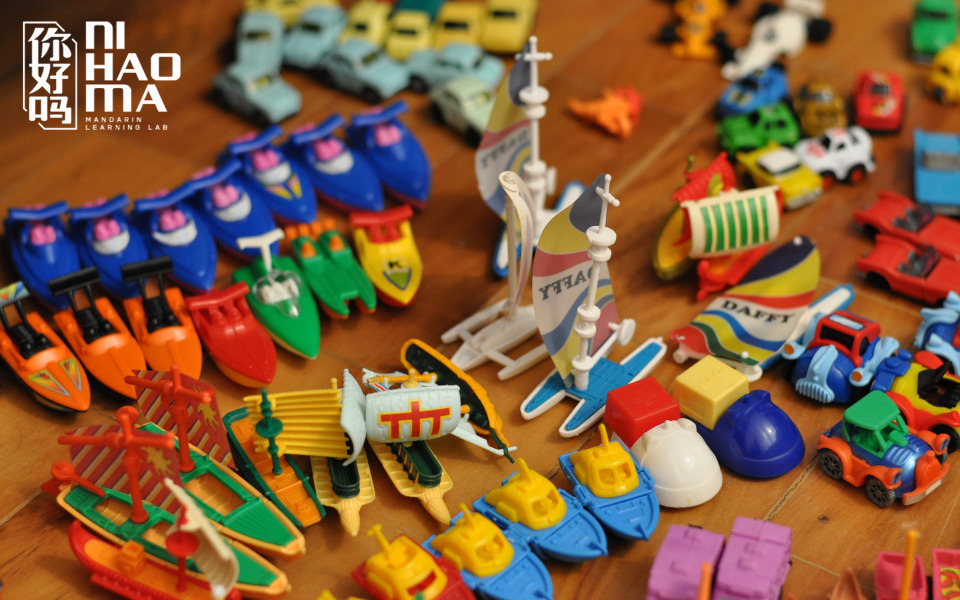
Chinese Vocabulary for Games
| Chinese | Pinyin | Meaning |
|---|---|---|
| 狼人杀 | láng rén shā | Werewolf |
| 麻将 | má jiàng | Mahjong |
| 国际象棋 | guó jì xiàng qí | Chess |
| 中国象棋 | zhōng guó xiàng qí | Chinese chess |
| 五子棋 | wǔ zǐ qí | Gomoku |
| 跳棋 | tiào qí | Checkers |
| 围棋 | wéi qí | Go |
| 多米诺骨牌 | duō mǐ nuò gǔ pái | Domino |
| 飞行棋 | fēi xíng qí | Flying chess |
| 叠叠乐 | diédié lè | Jenga |
| 踢毽子 | tī jiàn zi | Shuttlecock kicking |
| 大富翁 | dà fù wēng | Monopoly |
| 剪刀石头布 | jiǎn dāo shí tóu bù | Rock-paper-scissors |
| 捉迷藏 | zhuō mí cáng | Hide and seek |
| 纸牌接龙 | zhǐ pái jiē lóng | Solitaire |
| 桌游 | zhuō yóu | Board game |
| 卡牌游戏 | kǎ pái yóu xì | Card game |
| 台球 | táiqiú | Billiards |
| 保龄球 | bǎolíngqiú | Bowling |
| 卡坦岛 | Kǎtándǎo | Catan |
Game-related Activities in Chinese
| Chinese | Pinyin | Meaning |
|---|---|---|
| 玩游戏 | wán yóuxì | to play a game |
| 参加游戏 | cān jiā yóuxì | to join a game |
| 组织游戏 | zǔ zhī yóuxì | to organize a game |
| 开始游戏 | kāi shǐ yóuxì | start the game |
| 结束游戏 | jié shù yóuxì | end the game |
| 轮到你了 | lún dào nǐ le | it’s your turn |
| 排队 | pái duì | line up |
| 投骰子 | tóu shǎi zi | roll the dice |
| 抽卡牌 | chōu kǎ pái | draw a card |
| 抽签 | chōu qiān | draw lots |
| 移动棋子 | yí dòng qí zi | move a piece |
| 设规则 | shè guī zé | set the rules |
| 分数 | fēnshù | score |
| 胜利 | shèng lì | win |
| 失败 | shī bài | lose |
| 赢了 | yíng le | won |
| 输了 | shū le | lost |
| 平局 | píng jú | draw |
| 骗人 | piàn rén | to bluff / trick |
| 升级 | shēngjí | level up |
| 玩家 | wánjiā | player |
| 轮流 | lún liú | take turns |
| 扮演角色 | bàn yǎn jué sè | play a role |
| 配合团队 | pèi hé tuán duì | cooperate with team |
| 分组比赛 | fēn zǔ bǐ sài | team competition |
| 倒计时 | dào jì shí | countdown |
| 换人 | huàn rén | change player |
| 看牌 | kàn pái | check cards |
| 出牌 | chū pái | play a card |
| 洗牌 | xǐ pái | shuffle cards |
| 规则 | guīzé | game rules |
| 回合 | huíhé | round |
| 游戏机 | yóu xì jī | game console |
| 卡片 | kǎ piàn | card |
| 拼 | pīn | to assemble / put together |
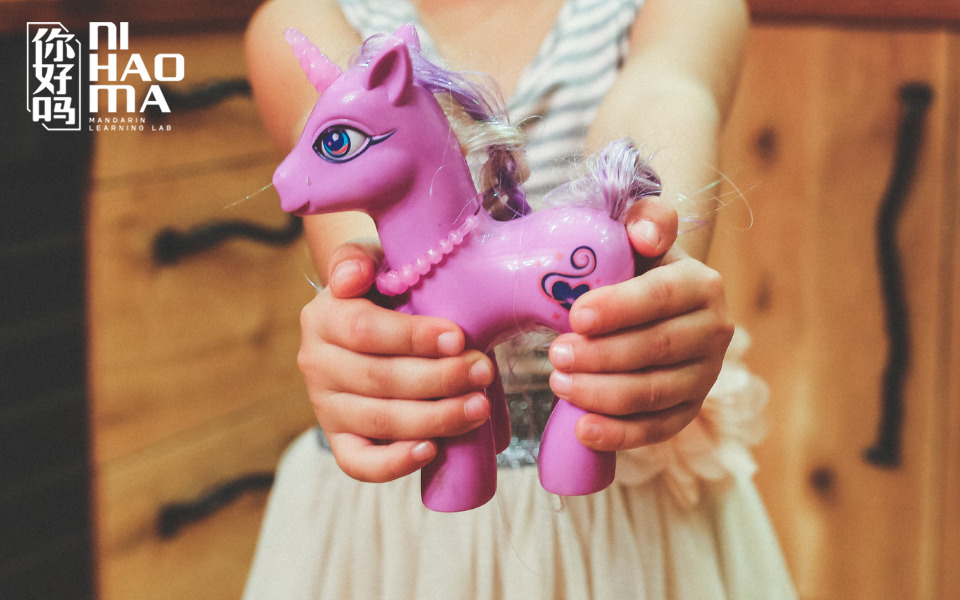
Chinese Vocabulary for Traditional Folk Games
| Chinese | Pinyin | Meaning |
|---|---|---|
| 捉迷藏 | zhuō mí cáng | Hide and seek |
| 跳房子 | tiào fáng zi | Hopscotch |
| 拔河 | bá hé | Tug of war |
| 丢手绢 | diū shǒu juàn | Handkerchief throwing game |
| 蒙眼抓人 | méng yǎn zhuā rén | Blindfold tag |
| 石头、剪子、布 | shí tou, jiǎn zi, bù | Rock-paper-scissors |
| 踩高跷 | cǎi gāo qiào | Stilt walking |
| 套圈 | tào quān | Ring toss |
| 播棋 | bō qí | Traditional boardgame |
| 跳竹竿 | tiào zhú gān | Bamboo pole dance game |
| 打弹珠 | dǎ dàn zhū | Marble shooting |
| 斗鸡 | dòu jī | Chicken fight |
| 踢毽子 | tī jiàn zi | Shuttlecock kicking |
| 跳绳 | tiào shéng | Jump rope |
| 木头人 | mù tóu rén | “Freeze” game (players must stay still on command) |
| 抢椅子 | qiǎng yǐ zi | Musical chairs |
Vocabulary for Types of Toys and Games
| Chinese | Pinyin | Meaning |
|---|---|---|
| 玩具 | wán jù | Toy |
| 游戏 | yóu xì | Game |
| 电动玩具 | diàn dòng wán jù | Electronic toy |
| 益智玩具 | yì zhì wán jù | Educational toy |
| 拼图玩具 | pīn tú wán jù | Puzzle toy |
| 手工玩具 | shǒu gōng wán jù | Handmade toy |
| 户外玩具 | hù wài wán jù | Outdoor toy |
| 女孩玩具 | nǚ hái wán jù | Toys for girls |
| 男孩玩具 | nán hái wán jù | Toys for boys |
| 传统玩具 | chuán tǒng wán jù | Traditional toy |
| 音乐玩具 | yīn yuè wán jù | Musical toy |
| 拼装玩具 | pīn zhuāng wán jù | Building toy / Assembling toy |
| 智力游戏 | zhì lì yóu xì | Brain game |
| 角色扮演游戏 | juésè bànyǎn yóuxì | Role-playing game (RPG) |
| 策略游戏 | cè lüè yóu xì | Strategy game |
| 解谜游戏 | jiě mí yóu xì | Puzzle game |
| 电子游戏 | diàn zǐ yóu xì | Video game |
| 动作类游戏 | dòng zuò lèi yóu xì | Action game |
| 冒险游戏 | mào xiǎn yóu xì | Adventure game |
| 教育类游戏 | jiào yù lèi yóu xì | Educational game |
| 赛车游戏 | sài chē yóu xì | Racing game |
Sample Dialogue: Buying Toys in Chinese
The topic of toys is not only familiar to children but also frequently appears in daily conversations. In this section, Ni Hao Ma presents sample dialogues that seamlessly integrate vocabulary related to toys in Chinese, offering learners an engaging and contextualized approach to language acquisition. The following example features a scenario in which a mother is selecting toys for her child:

A: 你好!我想给我的孩子买一些玩具。
(Nǐ hǎo! Wǒ xiǎng gěi wǒ de háizi mǎi yīxiē wánjù.)
Hello! I’d like to buy some toys for my child.
B: 好的,您看这边,我们有很多儿童玩具。您的孩子多大?
(Hǎo de, nín kàn zhèbiān, wǒmen yǒu hěn duō értóng wánjù. Nín de háizi duō dà?)
Sure, take a look over here. We have a wide variety of children’s toys. How old is your child?
A: 他三岁了。他很喜欢积木和玩具车。
(Tā sān suì le. Tā hěn xǐhuān jīmù hé wánjù chē.)
He’s three years old. He really likes building blocks and toy cars.
B: 三岁的话,这款益智积木很适合他。旁边还有各种模型玩具车。
(Sān suì de huà, zhè kuǎn yìzhì jīmù hěn shìhé tā. Pángbiān hái yǒu gè zhǒng móxíng wánjù chē.)
For a three-year-old, this set of educational building blocks is perfect. We also have many model toy cars nearby.
A: 这个机器人看起来也很有趣!
(Zhège jīqìrén kàn qǐlái yě hěn yǒuqù!)
This robot looks interesting too!
B: 是的,这款机器人可以唱歌、跳舞,还能说简单的话,很多小朋友都很喜欢。
(Shì de, zhè kuǎn jīqìrén kěyǐ chànggē, tiàowǔ, hái néng shuō jiǎndān de huà, hěn duō xiǎopéngyǒu dōu hěn xǐhuān.)
Yes, this robot can sing, dance, and even say simple phrases. Kids love it!
A: 那我就买这个机器人和那套积木吧。谢谢你的推荐!
(Nà wǒ jiù mǎi zhège jīqìrén hé nà tào jīmù ba. Xièxiè nǐ de tuījiàn!)
I’ll take this robot and that block set then. Thanks for the recommendation!
Conclusion
We hope this article from Ni Hao Ma helped you learn useful vocabulary related to toys in Chinese, along with how to apply it in real conversations. Whether you’re shopping for a child, working in education, or just exploring a fun topic in Mandarin, this vocabulary will come in handy. Stay tuned for more practical topics to boost your everyday Chinese. Don’t forget to share this post with others who might find it helpful—see you in the next one.
